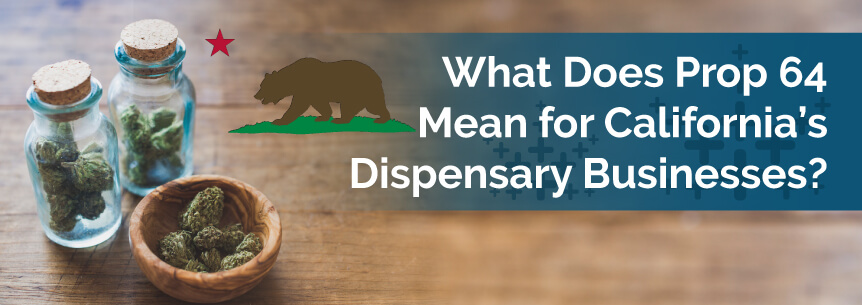Approved by California voters on November 8, 2016, the California Marijuana Legalization Initiative (California Proposition 64) makes it legal for state residents to grow and/or consume cannabis for personal use. However, non-medical dispensaries will not be able to sell marijuana for personal use until January 1, 2018. Once the sale of personal use cannabis begins, the state plans on implementing a tax on all marijuana consumables.
Although consuming cannabis for personal or medical reasons in California is now legal (up to specific amounts), it’s still illegal to possess or sell pot, according to federal law. In the event the federal government changes the legality of pot possession and use, Prop 64 includes provisions for allowing dispensaries to advertise on television, in newspapers, digital marketing, etc. only in locations where at least 71 percent of the medium’s audience is assumed to be over 21 years old.
Prop 64 Regulations That Will Affect California Marijuana Dispensaries
Entrepreneurs planning to take advantage of the booming pot industry in 2018 should be aware of the following regulations regarding legal operation of a cannabis dispensary in California:
- Only adults at least 21 years old will be allowed to purchase marijuana products. Adults can be in possession of 28.5 grams of pot and eight grams of concentrated cannabis.
- Individuals will be allowed to grow no more than six plants in their home. Growing spaces must be kept locked and invisible to the public.
- Marijuana dispensaries will need to obtain a state license before they can legally sell cannabis for personal use. In addition, local governments are permitted to instruct dispensaries to apply for a local license.
- Businesses selling pot products cannot operate within 600 feet of a youth center, daycare facility or school.
- Prop 64 incorporates regulations to prevent larger-scale cannabis businesses from obtaining licenses for five years. This is to stop “unlawful monopoly power.”
- Regulation of the sale of recreational cannabis will be overseen by the Bureau of Marijuana Control (originally called the Bureau of Medical Cannabis Regulation). The Bureau of Marijuana Control will also be responsible for issuing licenses to dispensaries.
- Marijuana sold for personal, non-medical use must be packaged in containers deemed child-resistant by state regulators.
- Businesses selling recreational marijuana will not be allowed to sell alcohol or tobacco in the same store.
Dispensaries that wish to advertise their business will have to abide by several Prop 64 laws. For example, they won’t be able to advertise on billboards or other devices located on a state highway or interstate highway crossing the border of another state, nor can they advertise marijuana products “in a manner meant to encourage those under 21 to use cannabis or cannabis-related products.”
Taxation of Marijuana Sold for Recreational Use in California
With the passage of the California Marijuana Legalization Initiative, dispensary owners can expect to deal with two excise taxes on cannabis: a 15 percent tax will be imposed on the retail price of cannabis products and a cultivation tax of $2.75 per ounce for marijuana leaves and $9.25 per ounce for marijuana flowers.
Exceptions to these taxes include certain medical marijuana cultivation and sales. According to Prop 64 language, taxes are inflation-adjustable beginning in 2020, and local governments are permitted to levy their own taxes on cannabis sales as well.
How Will California Spend Tax Revenue Gained From Recreational Pot Sales?
Retail and cultivation taxes will go directly into the California Marijuana Tax Fund. After first covering administrative costs, tax revenue is expected to be spent on drug treatment, enforcement and research, including several million dollars annually to the UC San Diego Center for Medical Cannabis Research and about $3 million each year to the California Highway Patrol for establishing protocols regarding OVI marijuana laws.
Another $10 million has been designated for researching and evaluating the effect of Prop 64 on socioeconomics in California. Any additional revenue, which is expected to increase progressively over the years, will be spent on youth programs, drug education/treatment and methods for reducing environmental destruction due to illegal pot producers.
Marijuana Product Labeling Requirements and Prop 64
Dried and packaged cannabis must be marked with labels indicating the package’s net weight, origin of the pot, type of marijuana (Indica or Sativa) and cultivation date. Each package label must also contain the amount of CBD, THC or other cannabinoids listed as milligrams per serving.
If any known fertilizers, herbicides or non-organic pesticides were used to grow the cannabis included in a product, dispensary owners must also list these on labels.
Regulating Marijuana Cultivation in California
Proposition 64 recognizes the fact that thousands of illegal pot growers in California are diverting or stealing millions of gallons of water without paying for these resources. Strict environmental laws delineated in the Adult Use of Marijuana Act are designed to ensure cannabis is grown legally and efficiently in California.
Regulating pesticide use and cracking down on illegal water consumption are two of the ways Prop 64 intends to support the business of selling pot for recreational use, while restoring land damaged by unethical cannabis growers. Dispensaries found non-compliant with environmental and water usage laws could have their licenses revoked.
Additionally, industrial hemp will be labeled as an agricultural product and regulated differently from cannabis strains presenting higher amounts of delta-9 tetrahydrocannabinoids.
Get in Touch With MarijuanaDoctors.com Today
In addition to providing evaluation and telemedicine services, symptom trackers and real-time information about the medical benefits of pot, MarijuanaDoctors.com is also the internet’s leading portal for reading about the latest industry news and ongoing efforts to legalize marijuana in states where it’s not legal to consume. Individuals with access to medical marijuana can also learn about the different strains of cannabis and which strains are considered the most effective at reducing the pain and discomfort of serious chronic illnesses.






